| Listing 1 - 7 of 7 |
Sort by
|
Book
ISBN: 9783631550090 Year: 2007 Publisher: Frankfurt am Main [etc.] Peter Lang
Abstract | Keywords | Export | Availability | Bookmark
 Loading...
Loading...Choose an application
- Reference Manager
- EndNote
- RefWorks (Direct export to RefWorks)
Capital punishment --- European literature --- Executions and executioners in literature --- Torture in literature --- Abolition of capital punishment --- Death penalty --- Death sentence --- History --- History and criticism --- Criminal law --- Punishment --- Executions and executioners
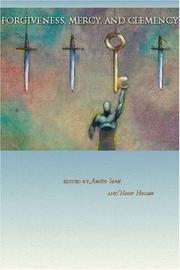
ISBN: 0804767920 1435608844 9781435608849 0804753326 9780804753326 0804753334 9780804753333 Year: 2007 Publisher: Stanford, Calif. Stanford University Press
Abstract | Keywords | Export | Availability | Bookmark
 Loading...
Loading...Choose an application
- Reference Manager
- EndNote
- RefWorks (Direct export to RefWorks)
Arguments for forgiveness, mercy, and clemency abound. These arguments flourish in organized religion, fiction, philosophy, and law as well as in everyday conversations of daily life among parents and children, teachers and students, and criminals and those who judge them. As common as these arguments are, we are often left with an incomplete understanding of what we mean when we speak about them. This volume examines the registers of individual psychology, religious belief, social practice, and political power circulating in and around those who forgive, grant mercy, or pose clemency power. The authors suggest that, in many ways, necessary examinations of the questions of forgiveness and pardon and the connection between mercy and justice are only just beginning.
Capital punishment --- Criminal justice, Administration of --- Clemency. --- Pardon. --- Pardon --- Executive power --- Amnesty --- Clemency --- Forgiveness --- Executive clemency --- Abolition of capital punishment --- Death penalty --- Death sentence --- Criminal law --- Punishment --- Executions and executioners --- Moral and ethical aspects. --- Law and legislation
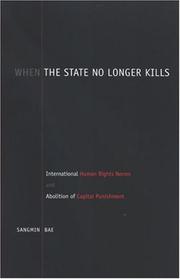
ISBN: 0791479471 1435617479 9781435617476 9780791472071 0791472078 9780791479476 Year: 2007 Publisher: Albany : State University of New York Press,
Abstract | Keywords | Export | Availability | Bookmark
 Loading...
Loading...Choose an application
- Reference Manager
- EndNote
- RefWorks (Direct export to RefWorks)
Despite public support for the death penalty, a remarkable number of countries in different parts of the world have banned capital punishment in all its forms, regardless of the nature of the crime or the criminal. Arguing that international norms are often a critical source of ideas for change in state policy, but that impact varies greatly, Sangmin Bae offers a systemic explanation of how, when, and under what conditions a country complies with international norms. She examines four countries that reached different stages of norm compliance with respect to the death penalty—Ukraine, South Africa, South Korea, and the United States. Focusing on the role of political leadership and domestic political institutions, Bae clarifies the causal mechanisms that lead to state compliance or noncompliance with the norm.
Human rights. --- Capital punishment. --- Basic rights --- Civil rights (International law) --- Human rights --- Rights, Human --- Rights of man --- Human security --- Transitional justice --- Truth commissions --- Abolition of capital punishment --- Death penalty --- Death sentence --- Criminal law --- Punishment --- Executions and executioners --- Law and legislation
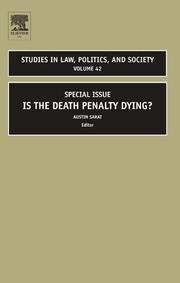
ISBN: 1281145106 9786611145101 1849505608 0080557287 9781849505604 0762314672 9780080557281 9780762314676 Year: 2007 Publisher: Bingley Emerald
Abstract | Keywords | Export | Availability | Bookmark
 Loading...
Loading...Choose an application
- Reference Manager
- EndNote
- RefWorks (Direct export to RefWorks)
This volume of "Studies in Law, Politics, and Society" presents a unique special issue "Is the Death Penalty Dying?." Drawing together an array of distinguished scholars from political science, criminology, sociology, and law, this volume provides a comprehensive assessment of the status of the death penalty in the United States, its past, and its trajectory for the future. Taken together, the work published in this volume exemplifies the kind exciting and innovative work now being done by legal scholars from different disciplines.This is a special issue examining the death penalty in the US. It draws together an array of distinguished scholars from political science, criminology, sociology, and law.
Capital punishment. --- Punishment. --- Penalties (Criminal law) --- Penology --- Abolition of capital punishment --- Death penalty --- Death sentence --- Corrections --- Impunity --- Retribution --- Criminal law --- Punishment --- Executions and executioners --- Criminal law. Criminal procedure --- United States --- Criminal law & procedure. --- Penology & punishment. --- Law --- Political Science --- Criminal Law --- General. --- United States of America
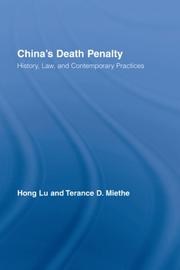
ISBN: 9780415955690 0415955696 9780203941300 9781135914875 9781135914912 9781135914929 9780415803960 Year: 2007 Publisher: New York Routledge
Abstract | Keywords | Export | Availability | Bookmark
 Loading...
Loading...Choose an application
- Reference Manager
- EndNote
- RefWorks (Direct export to RefWorks)
By all accounts, China is the world leader in the number of legal executions. Its long historical use of capital punishment and its major political and economic changes over time are social facts that make China an ideal context for a case study of the death penalty in law and practice. This book examines the death penalty within the changing socio-political context of China. The authors' treatment of China's death penalty is legal, historical, and comparative. In particular, they examine; the substantive and procedures laws surrounding capital punishment in different historical periods the purposes and functions of capital punishment in China in various dynasties changes in the method of imposition and relative prevalence of capital punishment over time the socio-demographic profile of the executed and their crimes over the last two decades and comparative practices in other countries. Their analyses of the death penalty in contemporary China focus on both its theory - how it should be done in law - and actual practice - based on available secondary reports/sources.
Capital punishment --- History. --- S08/0520 --- S08/0620 --- S08/0820 --- Abolition of capital punishment --- Death penalty --- Death sentence --- Criminal law --- Punishment --- Executions and executioners --- History --- China: Law and legislation--Civil law, human rights: since 1949 --- China: Law and legislation--Criminal: since 1949 --- China: Law and legislation--Administration of justice: since 1949
Book
ISBN: 9781847251718 1847251714 Year: 2007 Publisher: London Hambledon Continuum
Abstract | Keywords | Export | Availability | Bookmark
 Loading...
Loading...Choose an application
- Reference Manager
- EndNote
- RefWorks (Direct export to RefWorks)
Capital punishment --- Executions and executioners --- Peine de mort --- Exécutions capitales --- History --- Histoire --- Tyburn (London, England) --- Tyburn (Londres, Angleterre) --- Gallows --- History. --- Hanging --- Law --- Criminal law --- Criminal procedure --- Execution sites --- Abolition of capital punishment --- Death penalty --- Death sentence --- Punishment --- Antiquities --- Exécutions capitales --- Capital punishment - England - London - History - 18th century --- Capital punishment - England - London - History - 17th century --- Executions and executioners - England - London - History - 18th century --- Executions and executioners - England - London - History - 17th century --- Tyburn (London, England) - History - 17th century --- Tyburn (London, England) - History - 18th century
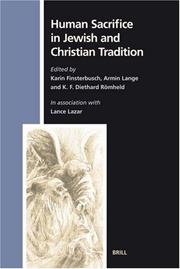
ISSN: 15709434 ISBN: 1281398659 9786611398651 904740940X 9789047409403 9004150854 9789004150850 Year: 2007 Volume: 112 Publisher: Leiden Boston Brill
Abstract | Keywords | Export | Availability | Bookmark
 Loading...
Loading...Choose an application
- Reference Manager
- EndNote
- RefWorks (Direct export to RefWorks)
This volume asks to which extent ancient practices and traditions of human sacrifice are reflected in medieval and modern Judeo-Christian times. The first part of the volume, on antiquity, focuses on rituals of human sacrifice and polemics against it, as well as on transformations of human sacrifice in the Israelite-Jewish and Christian cultures, while the Ancient Near East and ancient Greece are not excluded. The second part of the volume, on medieval and modern times, discusses human sacrifice in Jewish and Christian traditions as well as the debates about euthanasia and death penalty in the Western world.
Child sacrifice in the Bible. --- Child sacrifice --- Euthanasia. --- Assisted death (Euthanasia) --- Assisted dying (Euthanasia) --- Death, Assisted (Euthanasia) --- Death, Mercy --- Dying, Assisted (Euthanasia) --- Killing, Mercy --- Mercy death --- Mercy killing --- Homicide --- Medical ethics --- Assisted suicide --- Right to die --- Judaism. --- Christianity. --- Capital punishment --- Child sacrifice in the Bible --- Euthanasia --- 22.08*02 --- Abolition of capital punishment --- Death penalty --- Death sentence --- Criminal law --- Punishment --- Executions and executioners --- 22.08*02 Bijbelse theologie: mens; antropologie --- Bijbelse theologie: mens; antropologie --- Christianity --- Judaism --- Jesus Christ --- Christ --- Cristo --- Jezus Chrystus --- Jesus Cristo --- Jesus, --- Christ, Jesus --- Yeh-su --- Masīḥ --- Khristos --- Gesù --- Christo --- Yeshua --- Chrystus --- Gesú Cristo --- Ježíš --- Isa, --- Nabi Isa --- Isa Al-Masih --- Al-Masih, Isa --- Masih, Isa Al --- -Jesus, --- Jesucristo --- Yesu --- Yeh-su Chi-tu --- Iēsous --- Iēsous Christos --- Iēsous, --- Kʻristos --- Hisus Kʻristos --- Christos --- Jesuo --- Yeshuʻa ben Yosef --- Yeshua ben Yoseph --- Iisus --- Iisus Khristos --- Jeschua ben Joseph --- Ieso Kriʻste --- Yesus --- Kristus --- ישו --- ישו הנוצרי --- ישו הנצרי --- ישוע --- ישוע בן יוסף --- المسيح --- مسيح --- يسوع المسيح --- 耶稣 --- 耶稣基督 --- 예수그리스도 --- Jíizis --- Yéshoua --- Iėsu̇s --- Khrist Iėsu̇s --- عيسىٰ --- Crucifixion. --- Bible. --- Antico Testamento --- Hebrew Bible --- Hebrew Scriptures --- Kitve-ḳodesh --- Miḳra --- Old Testament --- Palaia Diathēkē --- Pentateuch, Prophets, and Hagiographa --- Sean-Tiomna --- Stary Testament --- Tanakh --- Tawrāt --- Torah, Neviʼim, Ketuvim --- Torah, Neviʼim u-Khetuvim --- Velho Testamento --- Ba-yon Tipan --- Bagong Tipan --- Jaji ma Hungi --- Kainē Diathēkē --- New Testament --- Nouveau Testament --- Novo Testamento --- Novum Testamentum --- Novyĭ Zavet --- Novyĭ Zavi︠e︡t Gospoda nashego Īisusa Khrista --- Novyĭ Zavit --- Nuevo Testamento --- Nuovo Testamento --- Nye Testamente --- Perjanjian Baru --- Dhamma sacʻ kyamʻʺ --- Injīl --- Criticism, interpretation, etc. --- Capital punishment. --- Sacrifice d'enfants dans la Bible --- Sacrifice d'enfants --- Euthanasie --- Peine de mort --- Judaïsme --- Christianisme --- Child sacrifice - Judaism. --- Child sacrifice - Christianity.
| Listing 1 - 7 of 7 |
Sort by
|

 Search
Search Feedback
Feedback About UniCat
About UniCat  Help
Help News
News